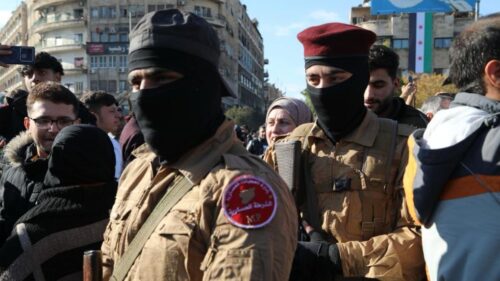A recent massacre at Latakia by pro-Hayat Tahrir al-Sham (HTS) security forces and militia, which left at least 1,300 dead, not only failed in establishing order but also exacerbated a number of security challenges for Damascus. Militants continued to threaten Alawites in the area, while Damascus appointed members of terrorist organizations such as Jabhat al-Nusra to prominent posts. Currently, the vacuum beyond Damascus remains open to the Islamic State (ISIS) and its affiliates, who are threatening to target Kurds and further destabilize the transition. Consequently, as Masood Al Hakari from Peace Research Institute Frankfurt (PRIF) puts it, extremist militants remain “far from defeated” across Syria; as the US withdraws, the jungle continues to showcase its limits to HTS governance, as well as the potential resurgence of terrorist groups.
Five months have passed since the capture of Damascus by al-Qaeda affiliated HTS militants, and still the charm offensive remains in full swing– much to the surprise of world leaders. Transitional president Abu Mohammed al-Jawlani (now Ahmed al-Shar’a) has managed to charm Western and regional governments through a number of superficial moves, in order to assume a non-threatening stance, in light of his past affiliations with ISIS and al-Qaeda. The obvious contradiction to this mirage arises from the number of extremists incorporated into governmental institutions, as well as security and military forces within Damascus and the periphery- all in plain view of Western and regional intelligence agencies, and at a time when social media activists are keeping global audiences fully educated about the situation.
Many remain highly skeptical over the process, leading HTS to change their approach, from global jihadist militants to a responsible government controlling an Arab capital. Questions remain over al-Jawlani’s ability to control jihadist elements within his new government, and his ability to contain and possibly eliminate those outside of his control. Jawlani may have committed to denounce and oppose terrorism, but does he have that capacity? Can al-Jawlani and his Cabinet contain jihadist within their ranks? How will the Transitional government deal with jihadist elements identified by Western governments across Syria’s periphery? These questions are vital as Jawlani seeks international legitimacy, and demands Western governments lift sanctions and assist in weapon procurement, so as to impose a monopoly over security forces beyond Damascus. An inability to prevent a resurgence of jihadist groups would represent a major threat for the US and European governments at a time when conflicts in the Middle East overstretch capabilities to deter threats to European territories.
Urgency to lift sanctions
While the EU and the UK government have rushed to lift sanctions on various Syrian entities, under the guise of facilitating development aid, the US awaits a response over vital concerns. Destruction of chemical weapons stockpile remains a regional and global concern, as much as the role of foreign fighters beyond the transition period. According to the UN, the “situation in Syria [remains] extremely fragile,” and lifting sanctions without a clear track record under the HTS government may prove regrettable in the short run.
Soon after announcing a new transitional Cabinet, the HTS-led government in Damascus supported by Turkiye launched another charm offensive focused on sanctions and relations with international finance institutions. Al-Jawlani’s government has prioritized a focus on revenue generating industries, beyond tax collection, with oil and gas production as a top priority. This was primarily behind the rush to reach an agreement with Kurds in the northeast. The unpredictability beyond Damascus, weak control over security forces, and radical militant groups cannot assure sustainable flow of fuel toward Damascus, who reached out to Iraq and Russia to fill the void- moves that are likely to raise further concerns among Western governments.
The rush to generate government revenue results from a need to pay government salaries and maintain public services. This primarily depends on al-Jawlani’s ability to govern. Without a proven record beyond the superficial ceremonies and choreographed walk-abouts in friendly neighborhoods, Western governments risk empowering a group of militants espousing jihadist ideologies and have yet to publicly denounce al-Qaeda or ISIS. Al-Jawlani and his lieutenants are carefully maneuvering amid the jungle encircled by militant factions allied with al-Qaeda and ISIS that do not share HTS goals and retain an anti-West jihadist ideology.
Al-Jawlani has incorporated HTS and Jabhat al-Nusra elements across police and security forces, but other factions beyond his reach continue to operate independently. New splinter groups likely seek to destabilize the fragile political transition in efforts to advance extremist ideologies, potentially challenging al-Jawlani’s version of a religious state.
Militants and monopoly on violence
In recent weeks, as Jawlani advanced his political and religious appointments, conflicts erupted in Hama and Homs. Some religious leaders are fueling sectarian and doctrinal conflicts, while militia continue attacks against Alawites beyond pursuit of Assadist loyalists. The extra-judicial killings have spread outside Latakia, exacerbating stability and challenging Jawlani’s efforts to establish a monopoly on weapons.
Following the massacre in Latakia in early March, residents reported kidnappings involving foreigners. Women have disappeared and been tortured according to recent reports. In areas like Homs, clerics were heard cursing non-believers on a university campus and civilians trying to ignite sectarian conflict. Whether crimes are committed by government security forces or militia, it is clear the HTS leadership does not have control outside Damascus and reality contradicts the media narrative aimed at Western capitals.
Jawlani’s charm offensive– hosting hundreds of diplomats to present an image of security– is contradicted by tensions and crimes along the coast and western regions. While groups linked to al-Qaeda and ISIS remain active across Syria, the crimes they commit against Alawite and Christians come along with concerns over potential attacks against security and military installations under control of HTS army. This was a tactic used by HTS forces who attacked Syrian military bases and seized weapons. Chemical weapons may be a priority to the US, but conventional arsenals are just as vital, especially for Syria’s neighbors.
The number of militants currently operating across Syria is unclear, but the number of foreign militants in detention camps as reported in March 2025 is about 23,000. According to the International Centre For Counter-Terrorism, in camps under Kurdish control alone there are about 5,400 Syrian nationals, with over “38,000 detainees…held in two heavily guarded camps, al-Hol and Roj”. Among the detainees there are about 8,000 militants from nearly 60 different countries as dispersed as Australia, China, France, Indonesia, Russia, Trinidad, Tunisia, the UK, and South Africa. A failure by Damascus to provide effective measures to secure these camps, and provide assistance to Syrian Democratic Forces (SDF) amid US withdrawal can spell disaster for Syria and its neighbors.
Western governments may be moving too fast with Damascus without the assurances needed to prevent a resurgence of global jihadist groups. The HTS-led government has yet to gain the capacity to provide such assurances, and while Turkiye has offered assistance, there is no concrete evidence of the capacity to deprive jihadists of a new safe haven. Tensions remain along the border with Lebanon, smuggling from Iran continues, all while Iraq has limited resources to assist a former security threat.
[Claudia Finak-Fournier edited this piece.]
The views expressed in this article are the author’s own and do not necessarily reflect Fair Observer’s editorial policy.
Support Fair Observer
We rely on your support for our independence, diversity and quality.
For more than 10 years, Fair Observer has been free, fair and independent. No billionaire owns us, no advertisers control us. We are a reader-supported nonprofit. Unlike many other publications, we keep our content free for readers regardless of where they live or whether they can afford to pay. We have no paywalls and no ads.
In the post-truth era of fake news, echo chambers and filter bubbles, we publish a plurality of perspectives from around the world. Anyone can publish with us, but everyone goes through a rigorous editorial process. So, you get fact-checked, well-reasoned content instead of noise.
We publish 3,000+ voices from 90+ countries. We also conduct education and training programs
on subjects ranging from digital media and journalism to writing and critical thinking. This
doesn’t come cheap. Servers, editors, trainers and web developers cost
money.
Please consider supporting us on a regular basis as a recurring donor or a
sustaining member.
Will you support FO’s journalism?
We rely on your support for our independence, diversity and quality.







Comment
I remember Condeleezza Rice in 2006 talking about the “birth pangs of a new Middle East.” Whatever happened to the baby (or babies) that whose birth provoked those pangs?